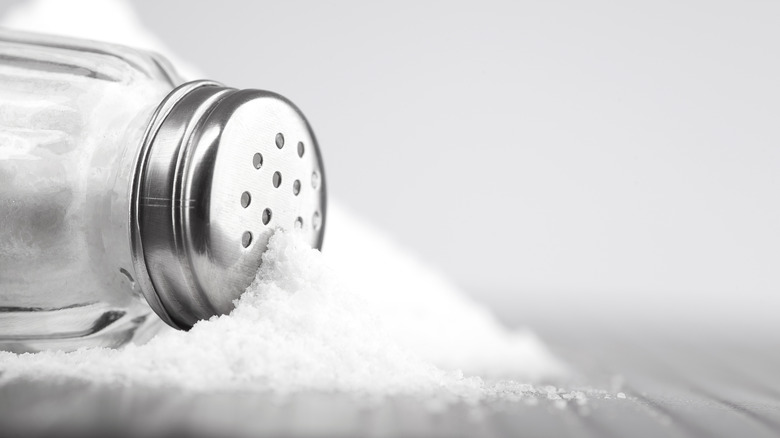The FDA Proposed New Salt Substitute Rules To Improve Nutrition
Whether it's a New Year's resolution or doctor's orders, attempts to eat healthier often include reducing the amount of salt one consumes. According to the American Heart Association, roughly 90% of Americans are overdoing it on salt, consuming over twice the daily recommended amount. Paul Breslin, Professor of Nutritional Sciences at Rutgers University, told Consumer Reports that humans' craving for salt is written into our genetic code and is crucial for the electrochemical processes that power our bodies. However, too much can increase our risk of kidney disease, heart attack, and stroke, as well as cause high blood pressure and other serious conditions.
In 2021, the FDA challenged food manufacturers to a voluntary goal of axing salt content by 12%. Now, the agency is proposing new guidelines they hope will stem the rise of preventable diet-related diseases. According to a report by the FDA, replacing some or all of the salt in prepared and processed foods with salt substitutes can lower one's sodium intake and improve overall nutrition. Salt substitutes have been on the market for years, but the FDA is now not only permitting but recommending their use. That's because, according to Susan Mayne, director of the FDA's Center for Food Safety and Applied Nutrition, the majority of average U.S. consumers' excessive salt intake comes from processed foods like sauces, soups, and snacks and not from home cooking or dining out at restaurants.
The salt (substitute) of the earth
The push for salt substitutes is part of the Biden-Harris Administration's National Strategy on Hunger, Nutrition, and Health. Former First Lady Michelle Obama opened the conversation with her "Let's Move" campaign in 2010 and healthy school lunch initiative in 2012. Now, the current administration is working to keep the ball rolling.
As manufacturers alter their products to fit the new guidelines, it's important for consumers to shop mindfully. According to Maxine Smith of the Cleveland Clinic, most salt substitutes achieve "saltiness" by replacing sodium chloride with potassium chloride. This is a good fit for folks who need to cut salt and incorporate more potassium into their diets, but it could be dangerous for consumers with underlying health conditions. For some, potassium can throw one's mineral levels out of balance, so consider your individual health needs when choosing to reach for salt substitutes or the real deal.
FDA Commissioner, Dr. Robert M. Califf, says this move is part of the FDA's larger goal of "creating a healthier food supply" for U.S. consumers. As part of the initiative, the FDA is also developing new qualifications for packaged and processed foods in order to be able to advertise the word "healthy" on their labels. The FDA is also creating a healthy symbol that manufacturers can display on the product labels if the product meets the agency's guidelines.

